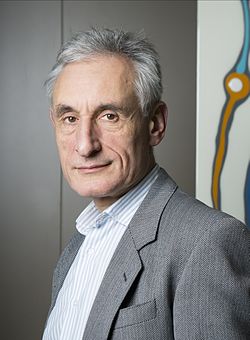Andrew Blake (computer scientist) Last updated June 12, 2025 Career and research Until 1987 he was on the faculty of the department of Computer Science at the University of Edinburgh, as a Royal Society University Research Fellow .[ citation needed ] Department of Engineering Science in the University of Oxford , where he became a professor in 1996, and was a Royal Society Senior Research Fellow for 1998-9.
In 1999 he moved to Microsoft Research Cambridge as senior research scientist, where he founded the Computer Vision Group. In 2008 he became a deputy managing director at the lab, before becoming laboratory director in 2010. [ 9]
From 2015 to 2018 he was director at the Alan Turing Institute . [ 10]
Since 2018 he has been the inaugural chair of the Samsung AI Centre in Cambridge. [ 11]
Publications Markov Random Fields for Vision and Image Processing . 2011. MIT Press . [ 16] (Ed.) Active Vision . 1992. MIT Press. [ 17] Visual Reconstruction . 1987. MIT Press. [ 18] References 1 2 3 "BLAKE, Prof. Andrew" . Who's Who . Vol. 2000 (online Oxford University Press ed.). Oxford: A & C Black.(Subscription or UK public library membership required.) ↑ Anon (2005). "Professor Andrew Blake FREng FRS" . London: Royal Society . Archived from the original on 17 November 2015. "All text published under the heading 'Biography' on Fellow profile pages is available under Creative Commons Attribution 4.0 International License ." -- "Royal Society Terms, conditions and policies" . Archived from the original on 11 November 2016. Retrieved 9 March 2016 . {{cite web }}: CS1 maint: bot: original URL status unknown (link ) 1 2 Anon (2017). "List of Fellows of the Royal Academy of Engineering" . London: raeng.org.uk. Archived from the original on 8 June 2016. Retrieved 13 October 2014 . 1 2 Andrew Blake publications indexed by Google Scholar 1 2 Blake, Andrew (1984). Parallel computation in low-level vision ethos.bl.uk (PhD thesis). University of Edinburgh. hdl :1842/6632 . OCLC 56326330 . ↑ "Professor Andrew Blake" . Clare Hall, Cambridge . Retrieved 13 January 2020 . ↑ Author profile in the database zbMATH ↑ "Andrew Blake, School of Informatics, the University of Edinburgh" . University of Edinburgh. Archived from the original on 3 March 2016. Retrieved 31 March 2017 . 1 2 3 4 5 6 7 "Professor Andrew Blake" . Archived from the original on 28 December 2013. Retrieved 16 January 2014 . ↑ "Leadership – The Alan Turing Institute" . Turing.ac.uk . Archived from the original on 19 February 2017. Retrieved 31 March 2017 . ↑ "Samsung AI centre to be based at Cambridge" . BBC News . 22 May 2018. Retrieved 25 October 2021 . ↑ "CVPR and ICCV Best Paper Awards" . Tab.computer.org . Archived from the original on 13 November 2014. Retrieved 31 March 2017 . ↑ Toyama, Kentaro; Blake, Andrew (2002). "Probabilistic Tracking with Exemplars in a Metric Space". International Journal of Computer Vision . 48 (1): 9– 19. doi :10.1023/A:1014899027014 . ISSN 0920-5691 . S2CID 271041 . ↑ "The Mountbatten Medallists" . IET. Archived from the original on 4 May 2013. ↑ "PAMI Distinguished Researcher Award" . IEEE. Archived from the original on 7 August 2016. Retrieved 31 March 2017 . ↑ Moolan-Feroze, Oliver; Schobert, Anne; Saj, Arnaud (January 2013). "Review: Markov Random Fields for Vision and Image Processing, in Your Face: The New Science of Facial Attraction" . Perception . 42 (1): 122– 125. doi : 10.1068/p4201rvw . ISSN 0301-0066 . S2CID 147213470 . ↑ Rosenfeld, Azriel (1 October 1993). "Book review: ACTIVE VISION. Edited by Andrew Blake and Alan Yuille (MIT Press, Cambridge, MA, 1992)" . ACM SIGART Bulletin . 4 (4): 13– 14. doi :10.1145/165482.1064764 . ISSN 0163-5719 . S2CID 8869336 . ↑ Howland, Howard C. (1 December 1988). "Visual Reconstruction. Andrew Blake, Andrew Zisserman" . The Quarterly Review of Biology . 63 (4): 481– 482. doi :10.1086/416096 . ISSN 0033-5770 .
International National Academics People Other
This page is based on this
Wikipedia article Text is available under the
CC BY-SA 4.0 license; additional terms may apply.
Images, videos and audio are available under their respective licenses.
